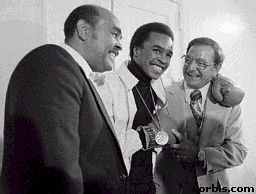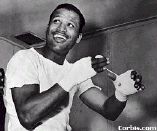There is a mental side to boxing. Men that climb between ropes to do battle
need not only to be physically fit, but also mentally attuned to face the
challenges of the ring. Making the body fit is a matter of roadwork, shadow
boxing, sparring and proper nutrition. Making the mind ready for battle is
much harder, for the ego, even among superb athletes, is fragile, demanding
constant reassurance in the face of danger and the possibility of defeat.
In my almost four decades involved with the Sweet Science, since I was a
teenager with delusional expectations of championship belts, I have seen,
heard or read about numerous examples of religious faith, superstitious
fetishes,
premonitions, mind games and confidence building among fighters and trainers.
Billy Petrolle, the tough welterweight known as "The Fargo
Express," favored
wearing the same fight robe as a good luck amulet. Willie Pep wore the same
suit on his way to fight arenas, only changing attire when a winning streak
was
snapped.
"When I lost to Sammy Angott," Pep said in an interview, "I
gave away my
lucky suit to a friend. Then, five years later, when I lost again, the same
guy comes back. I didn't lose very often so it was tough building a wardrobe
on my account."
 Sugar Ray Leonard carried photos of his family taped to the inside of his
Sugar Ray Leonard carried photos of his family taped to the inside of his
shoes during the Olympics. Henry Cooper, the likeable British heavyweight,
also taped religious medals in his shoes during his title bout with Ali,
although
it did not bring forth a victory.
Welterweight Gypsy Joe Harris felt rain on fight night was a good omen. Kid
Gavilan and Ali favored white trunks and numerous fighters have an
established sequence in the dressing room procedure.
In the Caribbean, my native haunt, boxing has often blended with
"Santeria,"
and "Voodoo," religions, creating a picturesque mosaic of surrealist
situations and interesting ring tales. Roberto Duran had four Santeria priests
or
consultants in his entourage during his glory days. During a trip to Panama,
his top consultant, Samuel Walker advised Duran to wear only white attire. The
great champion dressed in a white ensemble took a stroll through the streets
of
Panama City narrowly averting an accident when a bus almost ran him over. With
his spiritual beliefs shaken by the near miss, the man with hands of stone
confronted his advisor.
"You told me to wear white," Duran is said to have challenged
Walker, "and I
was almost run over by a bus."
"Yes," the quick thinking Walker answered, "and if you had
not worn white,
the bus would have surely hit you."
Livingston Bramble, one of the most colorful characters I've ever met in
the
fight game, also had a "Voodoo Doctor," which he claimed
"charges more for
title fights."
Douglas Valliant was a top Cuban lightweight who traded leather with Carlos
Ortiz and a score of top guns in his division. Valliant was a deep believer
in Afro-Caribbean religions. Another believer was Baby Luis (Emiro Durgel) a
featherweight who twice fought Vicente Saldivar.
"I once sent Douglas and Luis to fight in California," Angelo
Dundee related,
"and they were both believers of Santeria. They lit candles in their
hotel
room praying for victories and for no one to be seriously hurt, then went to
lunch
and left the candles burning. They almost burned down the hotel."
Baby Luis was a tough character with an ironic sense of humor. When
scheduled
to fight in England, he could not be located. Ferdie Pacheco hopped on a
plane to Mexico City and after searching through every gym in the city could
still
not locate the little scrapper.
"I was ready to leave Mexico," Ferdie related, "when a bus
stops in front of
the gym and Baby Luis comes out, looking like Cantinflas, the Mexican
comedian, all his clothing disheveled. I asked him where he's been and he said
&
"Well this guy gave me a bag of marihuana and I sat on a hilltop and
tried to figure out the meaning of life."
"So what is the meaning of life?" the Fight Doctor asked.
"The meaning of life is that I ran out of weed and I have to get some
more,"
the little fighter answered.
Old timers in Miami gyms, men like Caron Gonzalez and Luis Sarria often made
references to the tragic story of Baby Coullimber and his manager, Juan
Oliva.
Baby Coullimber was a triple national champion in Cuba over a half-century
ago. The tough little fighter was a son of Jack Coullimber, a Cuban boxing
pioneer of the early twenties. Juan Oliva, a former fighter, handled Baby and
together they were an explosive combination. Oliva was an argumentative
character who would not budge an inch and Baby Coullimber was a first rate
fighter who was terrified of Santeria hexes.
Once Coullimber's opponents realized his fears, they capitalized on his
weakness. The fighter would arrive at a dressing room in a fight arena to
find someone had left a dead black rooster or red bandanas tied in knots in
his
dressing room, hexes that preyed on his fragile psyche. Baby Coullimber lost
several fights he should have won because of his fear of Santeria, his
performances lacking in confidence. Blaming his manager for his loss to
Garcia Alvarez, a Spanish fighter, Baby Coullimber confronted Oliva. The story
ended in tragedy. Coullimber went to jail for killing Oliva.
If Coullimber was a victim of his own weakness, other Santeria believers
have
done quite well. Florentino Fernandez, the former middleweight contender with
a crushing left hook, traded leather with Gene Fullmer and Jose Torres,
retiring from the ring with some scar tissue and a clear head. Today in his
early
sixties, Fernandez attributes his good health to a belief in Santeria and
being protected by its Gods.
The powers of supernatural forces in boxing are not only restricted to the
Caribbean. Biographers of Jack Dempsey have related how his mother was told,
before his birth, that the child she carried in his belly would become
heavyweight champion like the "Great John L." Whether the story is
true or a
well-woven public relations legend, the tale of the clairvoyant traveling
salesman and Celia Dempsey has been repeated often.
Gamblers in New Orleans consulted Creole witches in search for an edge on
the
betting outcome of the Sullivan-Corbett fight of 1892 and African witches
were used to ballyhoo the Ali-Foreman clash in Zaire.
Marcel Cerdan Junior, who had a fair career in the sixties and early
seventies, claimed to feel the presence of his legendary father in his corner.
The elder Cerdan was killed in an airplane accident when his son was still
in
diapers.
 Sugar Ray Robinson dreamed about killing a man in the ring and the
following Sugar Ray Robinson dreamed about killing a man in the ring and the
following
day Jimmy Doyle died in their 1947 fight. Korean lightweight Duk Koo-Kim
scribbled "Kill or be Killed," on a lampshade of his hotel room
before dying
from a beating received by Boom-Boom Mancini.
George Foreman has claimed that he was changed from a surly slugger into a
likeable religious person by the voice of God in the dressing room after his
bout with Jimmy Young.
" Believing in God is good," I once heard trainer Caron Gonzalez
say to a
young fighter, "but in between prayers, you have to do roadwork."
Back To
WAIL! Contents Page
|